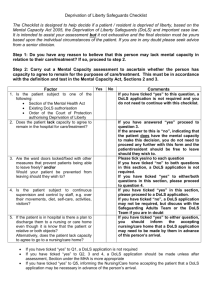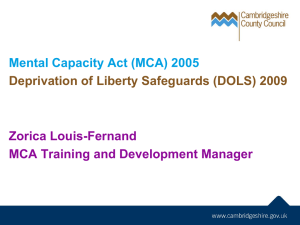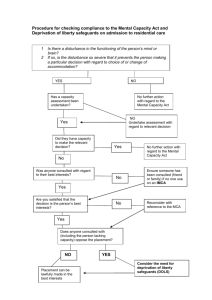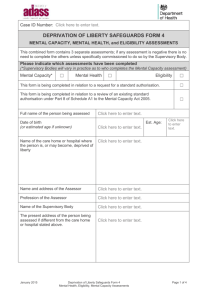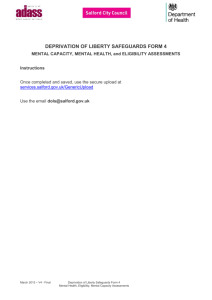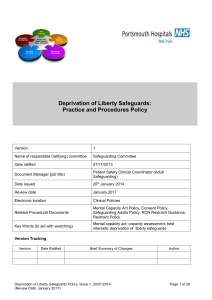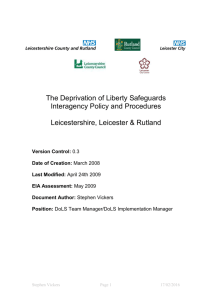1. Purpose of Report - Hertfordshire County Council
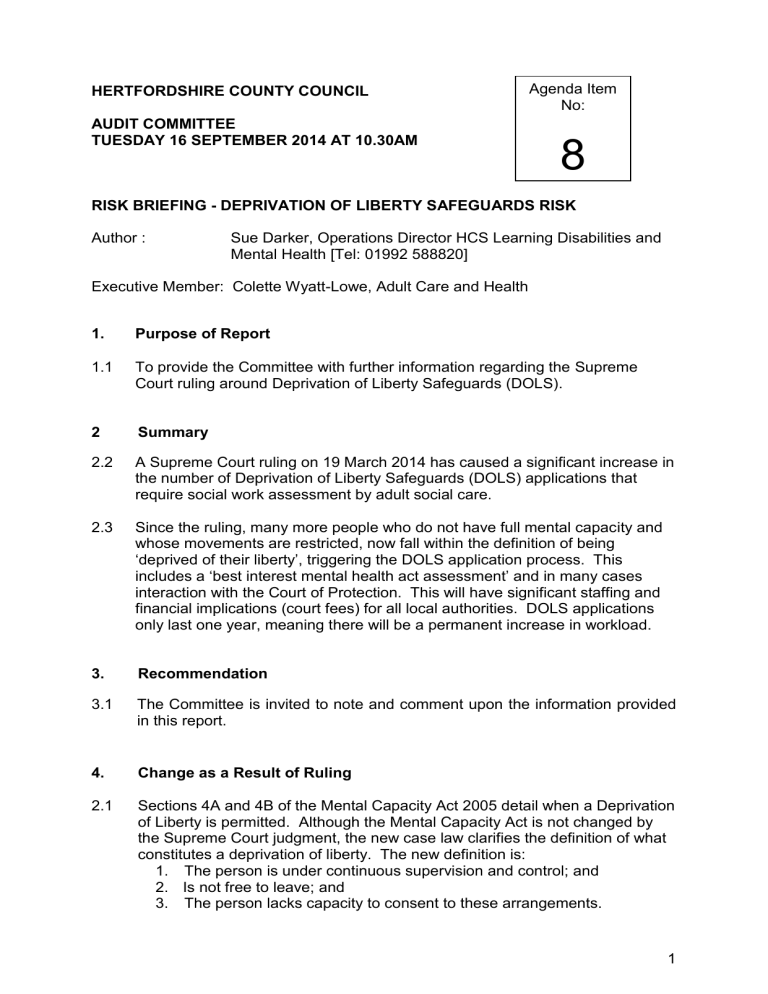
HERTFORDSHIRE COUNTY COUNCIL Agenda Item
No:
AUDIT COMMITTEE
TUESDAY 16 SEPTEMBER 2014 AT 10.30AM 8
RISK BRIEFING - DEPRIVATION OF LIBERTY SAFEGUARDS RISK
Sue Darker, Operations Director HCS Learning Disabilities and Author :
Mental Health [Tel: 01992 588820]
Executive Member: Colette Wyatt-Lowe, Adult Care and Health
1. Purpose of Report
1.1 To provide the Committee with further information regarding the Supreme
Court ruling around Deprivation of Liberty Safeguards (DOLS).
2 Summary
2.2 A Supreme Court ruling on 19 March 2014 has caused a significant increase in the number of Deprivation of Liberty Safeguards (DOLS) applications that require social work assessment by adult social care.
2.3 Since the ruling, many more people who do not have full mental capacity and whose movements are restricted, now fall within the definition of being
‘deprived of their liberty’, triggering the DOLS application process. This includes a ‘best interest mental health act assessment’ and in many cases interaction with the Court of Protection. This will have significant staffing and financial implications (court fees) for all local authorities. DOLS applications only last one year, meaning there will be a permanent increase in workload.
3. Recommendation
3.1 The Committee is invited to note and comment upon the information provided in this report.
4. Change as a Result of Ruling
2.1 Sections 4A and 4B of the Mental Capacity Act 2005 detail when a Deprivation of Liberty is permitted. Although the Mental Capacity Act is not changed by the Supreme Court judgment, the new case law clarifies the definition of what constitutes a deprivation of liberty. The new definition is:
1. The person is under continuous supervision and control; and
2. Is not free to leave; and
3. The person lacks capacity to consent to these arrangements.
1
4.2 Individuals may also be deprived of their liberty under the Mental Health Act if the requirements for detention under that Act are met.
5. Practice Implications for Hertfordshire
5.1 In light of the Supreme Court ruling, we have already received a huge increase in the number of requests for authorisations. 1500 authorisation requests have been received from hospitals and care homes and supported living providers (mainly covering older people with dementia and people with learning disabilities) since the ruling. Prior to the ruling, our annual number of requests was around 250 per year.
5.2 It has not been possible to deal with the volume of requests during May and
June within the 21 day legal time limit for a Standard Authorisation. A number of people are therefore technically being deprived of their liberty unlawfully.
This has been added to the corporate risk register. Every other local authority with social services responsibility has the same issue.
5.3 Mitigating actions already taken include:
DOLS paperwork simplified to reduce admin time
Six qualified Best Interest Assessors (BIAs) moved from their current social work teams to the DOLS team for 3 months
Additional external BIAs commissioned to undertake assessments
Letters sent to all providers asking them to consider the least restrictive environment for people – meaning a DOLS may not be necessary
HCC legal team interacting with Court of Protection to negotiate lighter legal process and bulk processing to reduce court fees and admin
Regular monitoring meetings chaired by an AD and briefing the
Executive Member
5.4 There are practice and resourcing implications for:
Staff within the DOLS Team
Supply of Section 12 Doctors (employed on a per assessment basis)
Supply of Approved Mental Health Practitioners (employed on a rota, mainly employed by HCS or HPfT)
Supply of Independent Mental Capacity Advocates (employed through
HCS via the overarching £1m PoHWER contract).
5.5 A Court of Protection Hearing was organised for 5 and 6 June which called expert witnesses including the President of ADASS. A national survey indicated a tenfold increase in work with court fees costing £45m alone.
ADASS are now lobbying the Department of Health and the Treasury for longterm support for the additional workload. A short-term best practice group has been set up to produce top tips and do immediate work with the courts.
DoLS Update for
Directors 12th June 2014.pdf
2
6. Financial Implications for Hertfordshire
6.1 Where people with a disability are living in supported living accommodation and are, by the nature of the regime, under constant observation or control
(e.g. where they are unable to leave the building without staff) they will in future be subject to DOLS application or a Court of Protection judgement.
6.2 This could ultimately lead to approx. 4500 applications from hospitals and older people’s care homes and 400 applications for people with learning disabilities which must be resolved via the CoP at approximate ly £4500 per head (inclusive of GP and Official Solicitors costs).
Pressure
2014/15 (£000s) 2015/16 (£000s)
DOLS Team staffing 90 110
CLDT staffing
Section 12 doctors
190
400
290
400
BIAs / AMHPs
IMCAs
CoP Legal Fees
TOTAL
300
50
1,800
2,830
350
50
1,800
3,000
CORPORATE RISK REGISTER
Risk Number
HCSMH0002
Risk Owner
Sue Darker
Date risk first included on risk register
Risk treatment
(response) to manage the risk
Department
HCS
Executive Member
03/06/2014 Reduce Colette Wyatt- Lowe
Short description of the risk
As a result of the New Supreme Court ruling around Deprivation of Liberty
Safeguards (DOLS) there is a risk that an inability to conduct best interests assessment within legal timeframes could lead to unlawful detention of people and potential legal and compensation challenges to HCC
Consequences of the risk
In the event of failing to manage the legal requirements to process DOLs application within the allotted 21 days.
This would result in an inability to deliver some business functions in the adult services areas, create a huge staffing resource implication, legal and court fees and potential litigation issues going forward.
3
Current controls
The controls surrounding the risk are as follows:
001 - DOLs team and Senior Managers are meeting weekly with lawyers to assess and manage the influx of assessments. Maintain Best Interest work and reduce the risk of harm to vulnerable adults and potential litigation.
002 – Communications sent to Providers from Supervisory Body and further communications being sent from HCS Director.
003 – Projection for next years workload – forward planning.
Financial implications of huge overspend of staff time, plus court and legal costs, presently looking to be ongoing business as usual.
Current Risk score based on effectiveness of current controls Q1 2014/15
Likelihood score: Impact score:
4 Likely 8 High
Overall score:
32 Severe
Reason for inclusion on Corporate Register
The recent Supreme Court ruling/s have led to a significant rise in DOLS applications, not all of which can be processed within the prescribed timeframe. The possible impacts of this make this a corporate risk.
.
Direction of travel (overall risk score for previous three quarters) n/a
Target risk score n/a n/a
Likelihood score:
3 Possible
Impact score:
8 High
Overall score:
24 Significant
Reason for changes in risk score. n/a
4
